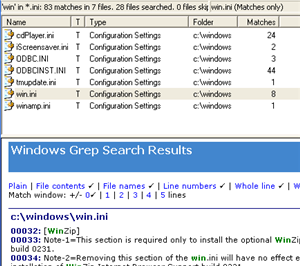

That, as we can see, allows you to view and filter correctly without losing information.įinally, using dos2unix does not work for you in this case, because the command requires that the files be plain text, and your file does not have that encoding (see dos2unix ). For instance, you can’t normally grep through a binary file, since binary files don’t contain much raw text. Doing it via the command line or stepping through the setup (i.e.
GREP BINARY FILE MATCHES ISO
German / Deutsch Süd (ISO Latin-1 / ISO 8859-1) German / Deutsch S▒d (ISO Latin-1 / ISO 8859-1) Samples7.var: HTML document, ISO-8859 text Places a line containing -between contiguous groups of matches.-a, -text: Process a binary file as if it were text this is equivalent to the -binary-filestext option.-B NUM, -before-contextNUM: Print NUM lines of leading context before matching lines. (NOTE: instead of utf you could pass it to ASCII as you request, but then you may lose existing information in the original file such as the § symbol).įor example, taking this file we have $ file samples7.var Tag Description-A NUM, -after-contextNUM : Print NUM lines of trailing context after matching lines. Thus, in your case, you should convert this file to another one more suitable for your tools, for which, of course, there are many tools but for me, the one I like the most is iconv, which in your case would be something like (from the same ref) $ iconv -f ISO-8859-15 -t UTF-8 foo >foo.utf The -a parameter of grep forces it to ignore certain codes that are not interpreted as an ASCII text string (eg the \x0 ).
GREP BINARY FILE MATCHES HOW TO
In your case, the file is not binary, it has the ISO-8859 encoding and therefore you must use tools that know how to work (understand) such encoding.

This is equivalent to the -binary-files=text option.īut still I wonder, how can I convert this binary file to ASCII? Answer:Īctually, all files are binary (obviously), but when we give that binary encoding an X interpretation, then we say it is encoded X (or encoded in X). Process a binary file as if it were text I have noticed after grep has an option to search binaries, the -a : $ grep -a "12345" archivo.csv archived: bash, example, info tagged: grep. Use of this option forces grep to output lines matching the specified pattern <- from man. Normally grep will simply print Binary file matches if files contain binary characters. Follow StackStatus, visit our status blog or search our recent meta posts on the topic for more info.
GREP BINARY FILE MATCHES FULL
We’ll return with full functionality soon. I have converted it to UNIX with the dos2unix command: $ dos2unix archivo.csvĭos2unix: converting file archivo.csv to Unix format.īut the problem keeps popping up: $ grep "12345" archivo.csv solution: use -a text, example: tail -f grep -a 10.0.33.11. This site is currently in read-only mode. The find command can only filter the directory hierarchy based on a file’s name and metadata. Use grep to Find a File in Linux Based on Content.

So looking at the type of file in question, I see that it is … $ file archivo.csvĪrchivo.csv: ISO-8859 text, with very long lines, with CRLF line terminators Examples of grep: You can search the current directory with grep as follows: To check whether a directory exists or not Find the directory under root directory. If I use grep I find that the result does not appear, but only the indication that there is one in the file: $ grep "12345" archivo.csv It can also be controlled by the -binary-filesvalue parameter. rw-rw-rw- 1 yo yo 723M Dec 10 10:46 archivo.csv That is, you can add the -a parameter to make grep read all files in ascii format. I tried renaming it to /disk2/user/test/logs/, but it still says it is a binary file.I am looking for a certain string in a fairly large file: $ ls -lh archivo.csv I imagine somewhere in the log file are some control characters that are tricking grep, but the beginning and end of the file looks like normal text. The issue I'm facing is that grep finds the line but does not give it to me, instead printing message about it being a binary file: > grep -n 6307459 /disk2/user/test/logs/-23-42-52-7224.logīinary file /disk2/user/test/logs/-23-42-52-7224.log matches I am using grep to match a pattern, but the output is strange. I'm using grep to find the line number of the occurrence and then using head and tail to get the section I'm interested in reviewing. Pipe binary file matches grep results to file. It is huge and I need to find around a million lines starting from the occurrence of a string 6307459 in the log file and view it in emacs. I'm on Centos 5 Linux and using GNU grep v2.5.1 and looking at a 36GB log file.


 0 kommentar(er)
0 kommentar(er)
